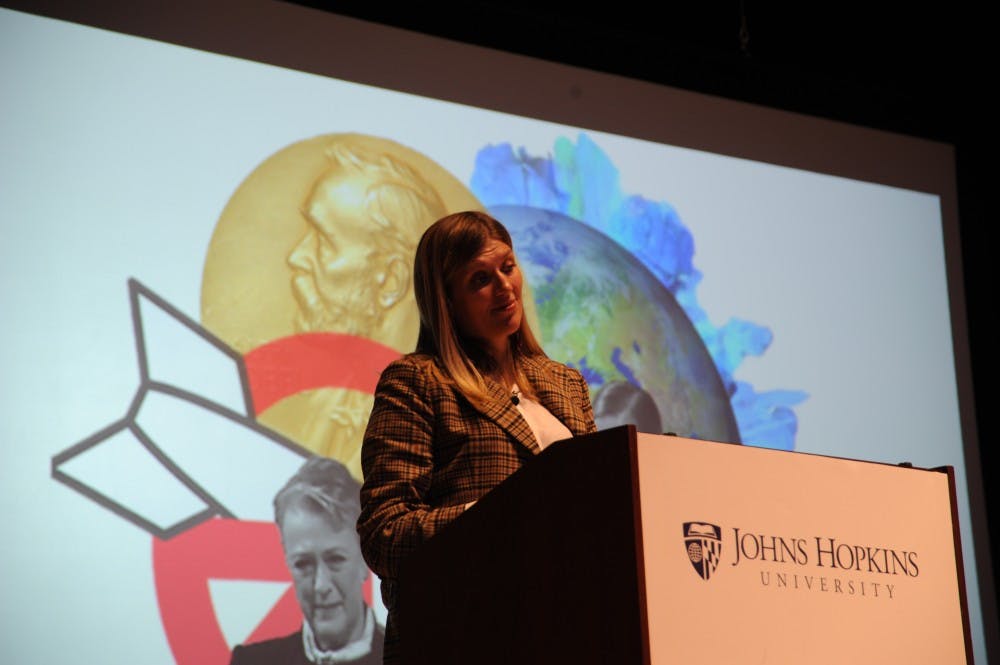Beatrice Fihn, the executive director of the International Campaign to Abolish Nuclear Weapons (ICAN), discussed nuclear disarmament during the third Foreign Affairs Symposium (FAS) event on Wednesday.
Fihn has led ICAN since 2013 and has worked to garner support for the Treaty on the Prohibition of Nuclear Weapons, a United Nations treaty that would ban nuclear weapons under international law. She accepted the Nobel Peace Prize and delivered the Nobel Lecture in Oslo on behalf of the organization in 2017.
Fihn opened her talk by encouraging the young people in the audience to use their talents and creativity to positively impact society. However, she acknowledged that the opinions of young people are often trivialized by authority.
“Our world celebrates and relishes [youth] in many ways, but not when it comes to power. That is where young people are often told to be quiet, to wait their turn, that they are simply too young or naive to understand. It is very similar to the arguments used to dismiss ICAN,” she said.
Fihn explained that impatience is one of the defining characteristics of youth and is often the catalyst for change.
Fihn also cautioned that one person cannot effect change. Instead, she believes that movements like ICAN, which is a coalition in more than 100 countries, succeed because change arises through the collective actions of a community.
“To those who want to become leaders and change the world: Find your community, find your people and then ask them what you need, then build together,” she said.
Fihn then discussed the “solvable” issues that arise from nuclear weapons.
“We need to move away from the understanding of international relations as a series of zero-sum battles and accept that nuclear weapons know no borders,“ Fihn said.
She enumerated examples of recent flare-ups in the landscape of nuclear warfare, such as the breakdown of the Iran nuclear deal, the false nuclear alarm in Hawaii and heightened tensions between the nuclear powers India and Pakistan.
In July 2017, the federal government awarded the Johns Hopkins Applied Physics Laboratory (APL) a $93 million contract to continue its engineering and research work with the Air Force Nuclear Weapons Center. The University will provide specialized engineering and research development requirements to build the U.S. nuclear arsenal.
APL supports U.S. government agencies in developing technology for national security and other national concerns. It has been involved in evaluating and improving the technology for the Minuteman III nuclear warhead.
Fihn described a hypothetical scenario to emphasize the damages that such a weapon could cause.
“If one Minuteman III warhead were to fall on this building right now, windows would shatter from Towson in the north to BWI in the south. Around 300,000 people will be killed immediately. Around 400,000 more would be injured. This does not include people who will die over the coming days, weeks, years and decades from horrible cancers,” she said.
Furthermore, in case of a nuclear incident, treatment options are limited, Fihn said. There are only two radiation beds in the entire United Kingdom -- not enough burn beds to treat the millions who might be affected in the event of a nuclear attack. Relief organizations like the American Red Cross and the UN have already stated that they do not have the capacity to effectively help victims of a nuclear disaster.
According to Fihn, proponents of nuclear armament ignore three realities: nuclear weapons are weapons of mass-destruction; the weapons are not strategic, but are destroyers of cities; they are manmade and therefore can be dismantled with ease.
“As the South African delegation in the United Nations described it, we currently have a kind of nuclear apartheid; some countries are allowed to have nuclear weapons, most of them are not. That’s not a very stable system,” Fihn said.
Senior Nicholas Piwonka attended the talk and believes that the goal of complete denuclearization is idealistic. He argued that nuclear weapons are a source of power for the nations that possess them; the loss of power that disarmament entails makes it an unlikely policy option.
“For me it’s hard to believe that nuclear powers would want to get rid of something so important to their geopolitical standing. The global order is entrenched because of nuclear weapons,” he said.
Another criticism was that denuclearization increases vulnerability to rogue attacks from other nations which do not denuclearize. In other words, although international law may prevent the possession of nuclear weapons, nations may ignore those laws. In response, Fihn asserted, that the power and strength of norms ensure that certain laws are followed.
In 2017, the UN opened the Treaty on the Prohibition of Nuclear Weapons for signatures. Only 50 nations have ratified it since. The implementation of such a treaty would ban nuclear weapons under international law. Fihn stated that, consequently, Hopkins and similar research institutions would be defying those laws by providing material support for the production of nuclear weapons.
Sophomore Class President Sam Schatmeyer is opposed to the partnership between the APL and Air Force Nuclear Weapons Center.
“I don’t think that we should be taking contract dollars just to take contract dollars and improve ourselves as an institution,” Schatmeyer said. “As an institution, our actions cannot be viewed and should not be viewed as apolitical. I think it’s a shame that the APL is working with the Air Force nuclear program.”
Fihn called the audience to action to voice their discontent with the what she described as the University’s complicity in the nuclear arms race.
“You, the students, are stakeholders. You can take up the mantle that cities, states, nations, companies, campaigners, humanitarians have taken up. Bound together you can write letters to your deans, your presidents, your teachers, learn how your university and community whose services you use are complicit in the use of nuclear weapons,” Fihn said.





